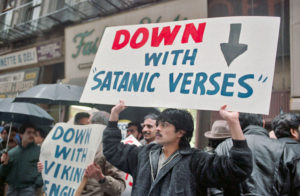Is it ever possible to take a neutral position on the importance of free speech? The task certainly seems quite difficult. As Vogue’s favourite philosopher, Amia Srinivasan, notes this month in the London Review of Books, many Right-wingers seem to assert the value of free speech, mainly or even only to make room for political views the Left would prefer smothered at birth. Occasionally, someone on the Right will complain about the suppression of a position or person they don’t agree with, but usually more to avoid complaints of inconsistency than anything else.
The Left, however, also has its blind spots — many of which are apparent in Srinivasan’s essay. Scathing about the new Higher Education (Freedom of Speech) Act’s attempt to create a culture which promotes academic freedom in UK universities, she barely acknowledges the problems diagnosed by its authors and defenders. Instead, as many a defensive-sounding progressive has implied before her, real cancellation almost never happens in academia — except, of course, where it happens to exactly those people who deserve it (cough).
Despite the occasional admission that campus life these days is becoming censorious and risk-averse, Srinivasan mostly presents the idea of cancel culture as confected by “Right-wing culture warriors”. (Even when you’ve previously written a book on contemporary sexual politics and are now writing about freedom of speech, becoming a culture warrior is still something that only happens to other people, apparently.)
Her framing is depressingly one-dimensional in other ways, too. Nasty Right-wing men twirl their moustaches and prosecute dastardly secret plans under cover of darkness. A bit like a window display in Ann Summers, dog whistles and fig leaves are everywhere you look. The Good Left bites its lip and stares nobly into the middle distance, trying to hold the line on causes such as anti-racism, trans rights and preventing climate change. Meanwhile, lecturers like me, who have experienced strong hostility within universities for expressing controversial academic views, have mistaken our hurt feelings over personal critique for a general social problem.
Indeed, academics like me are presented as somewhat confused about whether our speech has been suppressed at all — for some of us still write for newspapers and talk on television. As is often the case, the putative problem is treated as, at most, one of self-expression. Critics insist: didn’t you get your thoughts out into the world anyway? Well, then, what are you complaining about?
This assumption — that the plausibility of a given narrative about the suppression of an academic’s work is inversely proportional to the total number of her media appearances — ignores the obvious point that a set of ideas can be anathema in one venue and celebrated in another. For instance, as I’ve written before, though welcomed in some media outlets, gender-critical feminists seem to give Guardian and BBC editors a fit of the vapours.
And it’s strange that many progressives refuse to consider this general point. For one of their original critiques of free-speech defences made a somewhat similar observation, albeit about ethnic minorities rather than political ones. They held that such arguments don’t take account of how minorities can be systematically excluded from certain platforms and so don’t get a voice there.
Now, those who think of ideas as operating in a marketplace ruled by the laws of supply and demand might be happy with this. Maybe they think that — a bit like convincing an ice-cream parlour to stock your new brand — if you had really wanted to get your ideas into a particular forum, you should have made them more attractive in the first place. With ideas, though, perhaps unlike with ice cream, it’s not always wise to give the people exactly what they want.
In fact, self-expression or the lack of it is often not the main reason people are interested in academic freedom. The more pressing concern is whether conditions exist in universities that dissuade people from pursuing certain controversial topics out of fear alone. If so, and if those topics matter to society — which they often do, because public controversy is usually a sign of something mattering — then we all have a problem, and it’s one that goes well beyond hurt feelings.
In these cases, faulty beliefs are more likely to develop and spread, public frustration is more likely to proliferate, and policymakers will be more likely to act ineffectively and even harmfully as a result. There is no better example of this than the terrible state of the public conversations on women’s rights in relation to transactivism, and on the medical transition of minors — two conversations that are still very hard to have within UK universities without fear.
A separate pressing question about academic freedom, also nothing to do with self-expression, is whether the public is getting adequate access to a range of academic voices on controversial issues. This is not because academics need to be treated like rivalrous children, each getting the same number of pats on the head from Mummy and Daddy. It’s because if audiences are not exposed to a wide enough range of viewpoints about a given controversy, they will start to assume that the matter is settled. Worse, they might assume that everyone reasonable agrees the matter is settled, and so dismiss naysayers on the presumed authority of their favourite media sources. And their favourite media sources might be wrong.
Dropping Srinivasan’s emphasis on individual self-expression also has another benefit, in that it allows us to admit there might be circumstances where — perhaps with an initial air of paradox — certain kinds of speech should be regulated in order to avoid a chilling effect. On closer inspection, however, there is nothing paradoxical about suppressing some kinds of speech in order to facilitate others. Speech is one of the main tools used by humans to shut other humans up. There are clearly times when, given the further aim of a relatively open discursive environment, it is appropriate to disincentivise speech that does this.
For instance, unless the moral case is absolutely cut and dried in a way apparent to nearly everybody, I think we should dissuade people from implying, on behalf of supposedly politically neutral university organisations and institutions, that certain conclusions or discussions are ethically unacceptable. Whether it’s a manager writing a politicised tract against Brexit in an email to all staff, or a student tweeting out disgust for some invited speaker in the name of the society for whom he acts as president, the effect on dissenters within the same organisations is nearly always to make it harder for them to disagree with those in charge. (Exceptions might include associations whose explicit aims were to politically agitate in some direction — in which case, they should both make that prior agenda clear to joiners and not go off-piste).
So, unlike Observer columnist Kenan Malik commenting on a similar case a few weeks ago involving the Oxford University’s LGBTQ+ Society — an organisation that the uninitiated might assume was formed only to bring LGBTQ+ students together socially, regardless of political and philosophical commitments — I don’t think that regulating speech-that-chills-the-speech-of-others automatically counts as infringing individuals’ right to expression. The target, after all, is not the speech of individuals as such, but speech made by individuals on behalf of institutions. The individuals concerned are still free to express identical views in a personal capacity elsewhere. The familiar disclaimer “opinions expressed are my own and not that of my employer” is an easy one to adapt here.
Srinivasan, meanwhile, worries that the new Act threatens to undermine the basis of academic judgement itself — because, she says, much of what might look to some as speech suppression in academia is entirely legitimate. Academics, for instance, decide what can and cannot be said in seminars, journals and conferences on the basis of exercising specialist understanding about disciplinary standards and norms. The Act, she suggests, threatens to prevent academics from doing this.
But here she both overstates and understates the extent of academic competence. She overstates, because sometimes what passes for neutral academic judgement about the application of disciplinary standards is itself a way of suppressing politically unwanted conclusions, unconsciously or otherwise. This is particularly likely in high-stakes debates, where believers are convinced that there would be some terrible real-world consequences, were disbelievers to get the upper hand — climate change or vaccine discourse, for instance. Yet she also understates academic competence, by assuming there is no way of differentiating partisan cases from more neutral applications of disciplinary judgement. I’m sure academics could collectively develop an adequate methodology for this with a bit of thought. After all, they’re supposed to be good at this stuff.
Stepping back, it’s worth considering why discussions about free speech so often involve partisanship, or the projection of it onto others. To me, it seems partly due to two permanent features of human life, no matter what the historical situation.
The first of these is that truth matters to people — or more precisely, falsehood does. False beliefs cause actions to go wrong in various ways and can sometimes lead to disaster as reality suddenly hits you in the face. So — except in the special case where you positively want to deceive someone for self-interested reasons — we have a general vested interest in stopping false ideas from spreading.
The second fact is that everyone thinks their own beliefs are true, and that negations of their own beliefs are false. You might be able to admit to yourself that, in principle, given human fallibility generally, some unspecified proportion of your beliefs is likely to be false — but admitting this about any one belief in particular would be a short route to ceasing to hold it as a belief altogether.
Taken together, these two features give rise to some of the issues we see across the political spectrum. First, they make it easy to get aerated when you think your own true beliefs are under threat, but hard to summon up enthusiasm for the protection of what you judge are the false beliefs of others. This is why free speech defences are so often self-interested.
Second, because it is hard to enthuse about protecting other people’s false beliefs, people tend to assume that if you are defending free speech about a particular set of beliefs, you probably also secretly hold those beliefs, too. This explains why guilt-by-association so frequently gets employed against defenders of free speech, as if they must be using it as cover for more heinous opinions.
In fact, although it’s hard, it is possible to believe that speech — including academic speech — should mostly be free, without having some controversial position secretly in mind when you do it. The academic freedom of others is not just the freedom to hold conclusions you and your friends like. And we mustn’t let either Right or Left forget this.
Disclaimer
Some of the posts we share are controversial and we do not necessarily agree with them in the whole extend. Sometimes we agree with the content or part of it but we do not agree with the narration or language. Nevertheless we find them somehow interesting, valuable and/or informative or we share them, because we strongly believe in freedom of speech, free press and journalism. We strongly encourage you to have a critical approach to all the content, do your own research and analysis to build your own opinion.
We would be glad to have your feedback.
Source: UnHerd Read the original article here: https://unherd.com/



